I ran across this ancient meme on Facebook today and decided that it wasn’t too late to play. Here goes:
1. What was the last thing you put in your mouth? A complimentary sesame pretzel. It was doubleplusungood.
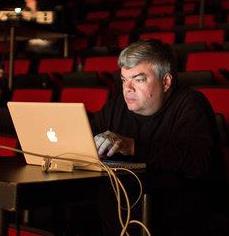 2. Where was your Facebook profile picture taken? Long Wharf Theatre in New Haven, Connecticut. (I change it according to mood, but that’s the one I posted this morning.)
2. Where was your Facebook profile picture taken? Long Wharf Theatre in New Haven, Connecticut. (I change it according to mood, but that’s the one I posted this morning.)
3. Can you play Guitar Hero? I don’t even know what it is!
4. Name someone who made you laugh today. So far, nobody.
5. How late did you stay up last night, and why? Two-thirty. I was reading a novel, William Haggard’s The Need to Know.
6. If you could move somewhere else, would you? That’s a huge “if.” All things being equal, though, I’d like to live on Florida’s Sanibel Island in the wintertime and the Berkshires in the summertime.
7. Ever been kissed under fireworks? No, but it sounds like fun.
8. Which of your friends lives closest to you? My next-door neighbor.
9. Do you believe exes can be friends? Absolutely.
 10. How do you feel about Dr Pepper? I’ve loved it ever since I was a boy. I actually visited the Dr Pepper Museum a couple of years ago.
10. How do you feel about Dr Pepper? I’ve loved it ever since I was a boy. I actually visited the Dr Pepper Museum a couple of years ago.
11. When was the last time you cried really hard? The day after my mother died.
12. Who took your profile picture? A photographer for the New York Times.
13. Who was the last person you took a picture of? Mrs. T. (I scarcely ever take pictures of anyone else.)
14. Was yesterday better than today? Yes. (Today has been pretty crappy, actually.)
15. Can you live a day without TV? Of course—I do it all the time. I turned on my hotel-room TV just once last week, and I turned it off again seconds later.
16. Are you upset about anything? No. Worried, yes; upset, no.
 17. Do you think relationships are ever really worth it? My God, yes.
17. Do you think relationships are ever really worth it? My God, yes.
18. Are you a bad influence? I certainly hope not.
19. Night out or night in? Tonight, in.
20. What items could you not go without during the day? I’d hate to be without a book or two.
21. Who was the last person you visited in the hospital? Mrs. T.
22. What does the last text message in your inbox say? “Yes, we did.”
23. How do you feel about your life right now? Pretty good.
24. Do you hate someone? Nobody whom I know personally.
25. If we were to look in your Facebook inbox, what would we find? Nothing.
26. Could you pass a drug test right now? Yes.
27. Has anyone ever called you perfect before? Not seriously.
28. What song is stuck in your head? For the moment, Charlie Parker’s “Billie’s Bounce.” It’ll almost certainly change within the hour, though. My earworms come and go with clock-like frequency.
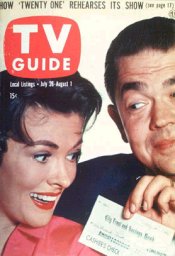 29. Someone knocks on your door at two a.m. Who do you want it to be?
Michael Anthony.
29. Someone knocks on your door at two a.m. Who do you want it to be?
Michael Anthony.
30. Want to have grandchildren by the time you’re fifty? Too late!
31. Name something you have to do tomorrow. Drive from Connecticut to Manhattan and back again, arrgh.
32. Do you think too much or too little? Much too much.
33. Do you smile a lot? Absolutely.

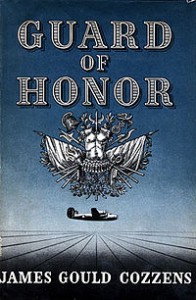 If you’ve never heard of Guard of Honor, you’re not alone. Though it won a Pulitzer Prize in 1949, it is as poorly remembered as the rest of Cozzens’ novels, and I doubt that it is ripe for revival. Set in a stateside Army Air Force base nine months before D-Day, most of its main characters are desk jockeys who almost certainly never made it to Europe or the South Pacific. Not surprisingly, nobody ever thought to turn the exploits of these indispensable yet invisible warriors into a movie; probably, nobody ever will. Yet Guard of Honor is a great novel all the same, the only English-language novel of World War II that can withstand comparison with Evelyn Waugh’s Sword of Honour.
If you’ve never heard of Guard of Honor, you’re not alone. Though it won a Pulitzer Prize in 1949, it is as poorly remembered as the rest of Cozzens’ novels, and I doubt that it is ripe for revival. Set in a stateside Army Air Force base nine months before D-Day, most of its main characters are desk jockeys who almost certainly never made it to Europe or the South Pacific. Not surprisingly, nobody ever thought to turn the exploits of these indispensable yet invisible warriors into a movie; probably, nobody ever will. Yet Guard of Honor is a great novel all the same, the only English-language novel of World War II that can withstand comparison with Evelyn Waugh’s Sword of Honour.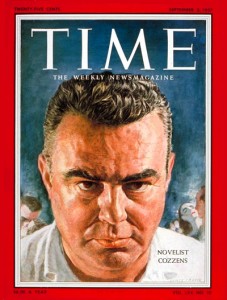 Part of what makes Guard of Honor so memorable is that its disillusion is untainted by cynicism. Cozzens spent most of the war pushing paper in the Pentagon, an experience that would have inspired the average novelist to write a very different kind of book. Instead he came away believing that most of the people whom he met while in uniform had done their best to do the right thing and, more often than not, did it pretty well.
Part of what makes Guard of Honor so memorable is that its disillusion is untainted by cynicism. Cozzens spent most of the war pushing paper in the Pentagon, an experience that would have inspired the average novelist to write a very different kind of book. Instead he came away believing that most of the people whom he met while in uniform had done their best to do the right thing and, more often than not, did it pretty well.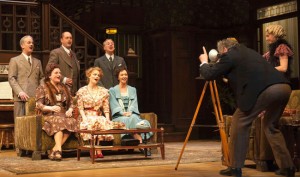 •
• 